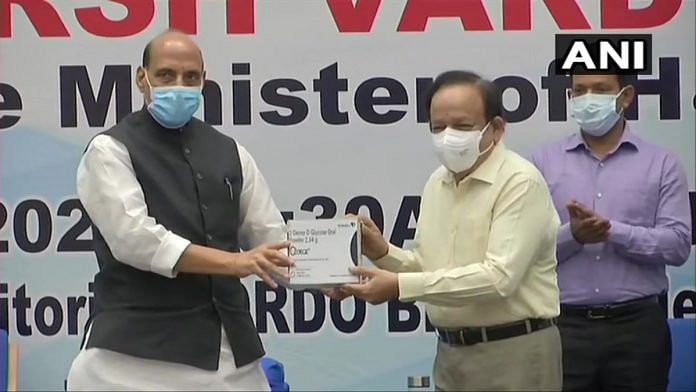
New Delhi: Defence Minister Rajnath Singh and Union Health Minister Dr Harsh Vardhan on Monday released the first batch of Anti-COVID drug 2-deoxy-D-glucose (2-DG) developed by the Defence Research and Development Organisation (DRDO).
The drug has been developed by DRDO’s Institute of Nuclear Medicine and Allied Sciences (INMAS) in collaboration with Dr Reddy’s Laboratories. DRDO Chairman Dr G Satheesh Reddy said that DRDO and Dr Reddy’s lab had gone through the complete trials and conducted trials across 30 hospitals and on a large number of patients.
The first batch of 10,000 doses of 2DG medicine would be launched early next week, informed DRDO officials to ANI on Friday.
The drug comes in powder form in a sachet, which is taken orally by dissolving it in water. It accumulates in the virus-infected cells and prevents virus growth by stopping viral synthesis and energy production. Its selective accumulation in virally infected cells makes this drug unique.
In the ongoing second COVID-19 wave, a large number of patients are facing severe oxygen dependency and need hospitalisation. The drug is expected to save precious lives due to the mechanism of operation of the drug in infected cells. This also reduces the hospital stay of COVID-19 patients.
Subscribe to our channels on YouTube & Telegram
Why news media is in crisis & How you can fix it
India needs free, fair, non-hyphenated and questioning journalism even more as it faces multiple crises.
But the news media is in a crisis of its own. There have been brutal layoffs and pay-cuts. The best of journalism is shrinking, yielding to crude prime-time spectacle.
ThePrint has the finest young reporters, columnists and editors working for it. Sustaining journalism of this quality needs smart and thinking people like you to pay for it. Whether you live in India or overseas, you can do it here.